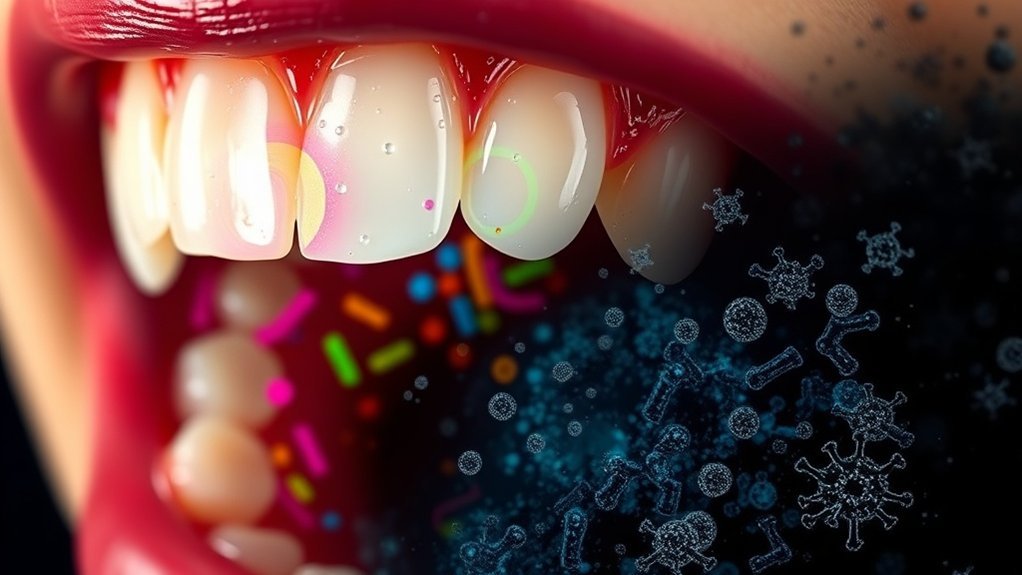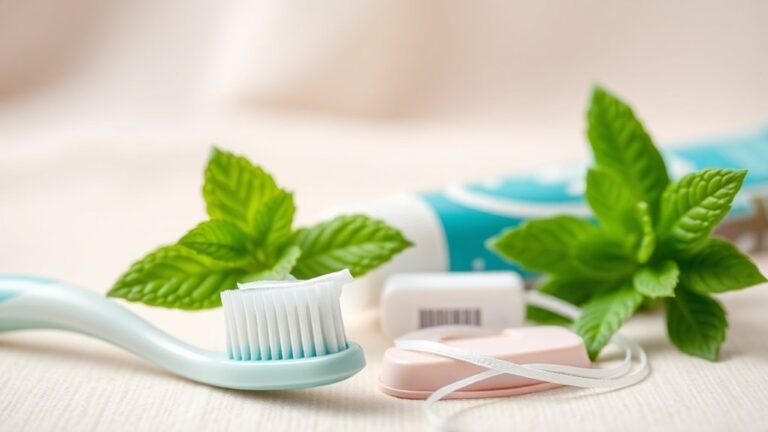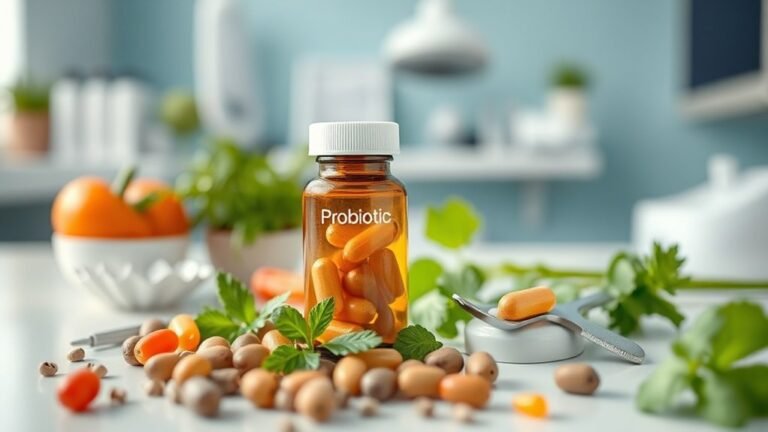Can Oral Probiotics Reduce Harmful Bacterial Plaque That Causes Cavities
Oral probiotics can effectively reduce harmful bacterial plaque that leads to cavities. They promote a healthier balance of microorganisms in your mouth by introducing beneficial strains like Lactobacillus and Bifidobacterium. These strains inhibit the growth of pathogenic bacteria, lowering acid production and plaque buildup. Studies show that probiotics enhance oral flora diversity, supporting overall dental health. For deeper insights into the types of probiotics and how to integrate them into your oral care routine, continue exploring this topic.
Key Takeaways
- Oral probiotics can enhance the balance of bacteria in the mouth, promoting beneficial strains that inhibit harmful bacteria linked to cavities.
- Specific strains like Lactobacillus reuteri and Streptococcus salivarius have shown effectiveness in reducing plaque and gingivitis.
- Probiotics work by competitive exclusion, reducing acid production from cariogenic bacteria such as Streptococcus mutans.
- Regular use of oral probiotics can improve microbial diversity, which supports overall oral health and lowers cavity risk.
- Incorporating probiotics into dental hygiene routines may complement traditional practices, enhancing plaque management and cavity prevention.
Understanding Oral Probiotics
While you might think of probiotics primarily in relation to gut health, oral probiotics are gaining attention for their potential benefits in maintaining oral hygiene. These beneficial microorganisms can positively influence the oral microbiome, enhancing its balance and function. Research indicates that oral probiotics may help reduce pathogenic bacteria, thereby promoting healthier gums and teeth. Specific strains, such as Lactobacillus and Bifidobacterium, have shown promise in clinical studies, suggesting they can lower the risk of dental caries and periodontal disease. By improving the overall microbial diversity in your mouth, oral probiotics may create an environment that supports oral health. As you explore these options, consider how integrating oral probiotics into your routine could benefit your dental hygiene strategy.
The Role of Bacterial Plaque in Cavities
Bacterial plaque plays an essential role in the development of cavities, as it serves as a breeding ground for harmful microorganisms that produce acids capable of demineralizing tooth enamel. When you neglect oral hygiene, bacterial plaque accumulates, creating an environment rich in cariogenic bacteria, such as Streptococcus mutans. These bacteria metabolize sugars from your diet, producing acids that lower the pH in your mouth. This acidic environment erodes enamel, leading to cavities over time. Furthermore, as plaque hardens into tartar, it becomes even more challenging to remove, exacerbating the problem. Regular brushing and flossing can help disrupt this plaque formation, reducing the risk of cavities and promoting better oral health. Understanding this process is vital for effective cavity prevention.
How Probiotics Work in the Oral Cavity
Probiotics, which are live microorganisms that confer health benefits, can play a significant role in maintaining oral health by influencing the balance of bacteria in your mouth. They help enhance the diversity of oral flora, which is essential for preventing harmful mouth bacteria from dominating. By introducing beneficial strains, probiotics can inhibit the growth of pathogenic bacteria that contribute to cavities. This competitive exclusion can alter metabolic pathways, reducing acid production and promoting a healthier pH in your oral cavity. Additionally, probiotics may enhance your immune response, enabling your body to better combat dental diseases. Overall, the strategic use of probiotics can create a more favorable oral environment, reducing the risk of tooth decay and promoting lasting oral health.
Scientific Studies on Probiotics and Oral Health
Research on probiotics reveals their potential to positively influence the oral microbiome, which can lead to a reduced risk of cavities. Numerous clinical trials have shown that specific probiotic strains can inhibit harmful bacteria associated with tooth decay. Understanding these findings can help you make informed choices about incorporating probiotics into your oral health routine.
Probiotics and Oral Microbiome
While many people might think of probiotics solely in relation to gut health, their influence on the oral microbiome has garnered significant attention in recent years. Scientific studies indicate that oral probiotics can help maintain a balanced bacteria environment in your mouth, which is essential for effective oral care. Research shows that specific strains, like Lactobacillus and Bifidobacterium, can inhibit harmful bacteria that contribute to dental issues. By promoting beneficial bacteria, probiotics may help restore the natural bacteria balance, reducing the risk of plaque formation. This shift in the oral microbiome not only supports overall oral health but also enhances your body’s defense against pathogens. Ultimately, incorporating probiotics into your routine could be a proactive step in maintaining ideal oral hygiene.
Reducing Cavities Risk
As you consider ways to reduce your risk of cavities, incorporating specific probiotic strains into your oral care routine can be a game changer. Research indicates that certain probiotics can enhance plaque control and contribute to cavity prevention. Here’s how they may help:
- Balance Oral Microbiome: Probiotics can shift harmful bacteria populations to beneficial ones.
- Inhibit Pathogen Growth: They may produce substances that hinder the growth of cavity-causing bacteria.
- Strengthen Salivary Defense: Probiotics can enhance saliva’s protective properties against decay.
- Support Gum Health: A healthier gum environment fosters better plaque management.
Clinical Trial Findings
Recent clinical trials have shed light on the potential benefits of oral probiotics for enhancing dental health. Studies reveal that specific probiotic strains can effectively reduce dental biofilm, the sticky layer of bacteria that contributes to cavities and oral infections. For instance, a trial involving Lactobacillus reuteri showed significant reductions in harmful bacteria compared to a placebo group. Participants who consumed probiotics exhibited improved oral microbiomes, leading to decreased plaque accumulation. Additionally, these probiotics may help balance the bacteria in your mouth, promoting a healthier environment. As researchers continue to explore these findings, it’s becoming increasingly clear that oral probiotics could be a valuable adjunct in preventing cavities and maintaining overall oral health.
Types of Probiotics Beneficial for Oral Care
Understanding the types of probiotics beneficial for oral care can greatly enhance your dental health. Research indicates that specific strains can effectively combat harmful bacteria associated with cavities. Here are four key probiotics to evaluate:
- Lactobacillus reuteri: Known for reducing plaque and gingivitis, this strain supports overall oral health.
- Streptococcus salivarius: This strain helps to balance oral flora and may inhibit cavity-causing bacteria.
- Lactobacillus rhamnosus: Evidence suggests it can lower the levels of harmful bacteria in the mouth.
- Bifidobacterium: Associated with improved gum health, it also contributes to a balanced oral microbiome.
Incorporating these probiotics into your routine could offer another layer of protection in maintaining ideal oral care.
Incorporating Probiotics Into Your Oral Hygiene Routine
Incorporating probiotics into your oral hygiene routine can greatly enhance your dental health by providing a natural defense against harmful bacteria. Oral probiotics, such as Lactobacillus reuteri and Streptococcus salivarius, have shown promise in reducing pathogenic bacteria linked to cavities. To effectively integrate these beneficial microorganisms, consider using probiotic lozenges or chewing gums after brushing your teeth. These forms allow probiotics to thrive in your oral cavity, promoting a healthier balance of bacteria. Additionally, maintaining a consistent dental hygiene regimen, including brushing and flossing, complements the benefits of oral probiotics. Research indicates that this combination can greatly decrease plaque formation and improve overall oral health. By making probiotics a staple in your routine, you can actively support your dental hygiene efforts.
Potential Benefits Beyond Cavity Prevention
While you’re primarily focused on cavity prevention, oral probiotics offer a range of additional benefits that extend beyond just oral health. These benefits can enhance your overall well-being:
Oral probiotics not only prevent cavities but also boost immunity and overall health.
- Enhanced Immune System: Probiotics can modulate your immune response, making you less susceptible to infections.
- Biofilm Management: They help balance oral biofilm, reducing harmful bacteria while promoting beneficial strains.
- Reduced Inflammation: Probiotics may lower inflammation in the mouth and body, contributing to better overall health.
- Improved Digestion: A healthy gut microbiome can support digestion, indirectly benefiting your oral health.
Limitations and Considerations of Oral Probiotics
When considering oral probiotics, it’s essential to evaluate their efficacy across different populations, as results may vary markedly. Additionally, the benefits often depend on specific strains, meaning not all probiotics will provide the same protective effects against cavities. You’ll need to scrutinize the available research to determine which strains are most effective for your needs.
Efficacy in Diverse Populations
Although oral probiotics show promise in reducing cavities, their efficacy can vary considerably across different populations due to factors such as age, ethnicity, and overall health. When considering oral probiotics for cavity prevention, you should keep the following in mind:
- Age: Younger individuals might respond differently compared to older adults.
- Ethnicity: Genetic variations can influence the oral microbiome and susceptibility to *Streptococcus mutans*.
- Health Status: Individuals with compromised immune systems may not benefit as effectively.
- Diet: Varied dietary habits can impact the effectiveness of oral probiotics in managing harmful bacteria.
Recognizing these factors is essential for tailoring probiotic interventions to maximize their effectiveness in reducing harmful bacterial plaque associated with cavities.
Strain-Specific Benefits Needed
The effectiveness of oral probiotics in cavity prevention largely hinges on the specific strains used. Not all probiotics are created equal; some strains may serve as effective anti-cavity agents, while others might have little to no impact on dental caries. Research shows that certain Lactobacillus and Bifidobacterium strains can inhibit the growth of harmful bacteria associated with cavities. However, without strain-specific studies, it’s challenging to determine which probiotics will truly benefit you. Additionally, the dosage and duration of use can notably influence outcomes. Consequently, relying on general claims about probiotics could lead to disappointment. It’s essential to choose formulations backed by robust clinical evidence that highlights their efficacy against dental caries, ensuring you’re making an informed decision for your oral health.
The Future of Probiotics in Dental Health
How can probiotics reshape the landscape of dental health? As research progresses, oral probiotics may emerge as a crucial component in preventing cavities and enhancing gum health. Here are four potential developments to reflect upon:
- Targeted Strains: Specific probiotic strains may be tailored to combat harmful bacteria linked to cavities.
- Synergistic Products: Future dental products could combine probiotics with traditional treatments, maximizing efficacy.
- Personalized Probiotic Plans: Customized regimens based on individual oral microbiomes may optimize outcomes for gum health.
- Regulatory Advances: Increased scientific validation may lead to probiotics gaining recognition in dental care guidelines.
Frequently Asked Questions
Can Children Safely Use Oral Probiotics for Dental Health?
Yes, children can safely use oral probiotics for dental health. Research suggests these probiotics may support oral microbiome balance, potentially reducing harmful bacteria. However, consult a pediatrician or dentist before introducing them to your child’s routine.
Are There Side Effects of Taking Oral Probiotics?
Yes, oral probiotics can cause side effects like bloating, gas, and digestive discomfort in some individuals. It’s important to monitor your body’s response and consult a healthcare professional if you experience persistent or severe symptoms.
How Long Does It Take to See Results From Probiotics?
You’ll likely see results from probiotics within one to four weeks, though some might experience changes sooner. Individual factors, like gut health and diet, can influence this timeline notably, so patience is key for ideal benefits.
Can Oral Probiotics Replace Traditional Dental Care?
No, oral probiotics can’t replace traditional dental care. While they may support oral health, they don’t address issues like plaque removal or decay prevention. You still need regular brushing, flossing, and dental check-ups for peak care.
Are All Probiotic Products Equally Effective for Oral Health?
Not all probiotic products are equally effective for oral health. Different strains target specific bacteria. You need to choose products backed by research to guarantee they provide the desired benefits for your oral microbiome.
Conclusion
Incorporating oral probiotics into your dental care routine could be a game-changer for your oral health. While they won’t replace traditional hygiene practices, these friendly bacteria might just lend a helping hand in combating harmful plaque and promoting a balanced oral microbiome. As research continues to unfold, you may find that these tiny powerhouses offer more than just cavity prevention, paving the way for a brighter, healthier smile. Embrace this innovative approach and keep your dental future shining.






